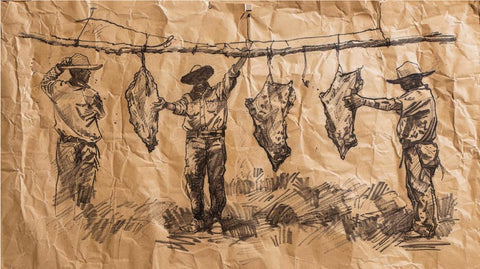The Origins of Biltong
Picture yourself as an intrepid explorer, traversing the vast landscapes of South Africa centuries ago. Hunger pangs strike, your supplies dwindle, and fresh meat seems an elusive dream. What do you do? Well, if you're a resourceful nomad, you turn to biltong, a dried, cured meat delicacy that has been a staple in South African cuisine for generations.
Biltong's roots can be traced back to the Bantu people, who migrated into Southern Africa around 2,000 years ago. These nomadic tribes faced the challenge of preserving meat during their long journeys, as refrigeration was not yet a reality. Their ingenious solution involved cutting meat into strips, curing it with salt and vinegar, and drying it under the scorching African sun or beneath the twinkling stars. This remarkable preservation technique allowed them to savor meat for weeks without the fear of spoilage.

Biltong's Transformation from Necessity to Beloved Tradition
As time marched forward, biltong evolved from a mere necessity for survival to a cherished culinary tradition. The Dutch settlers who arrived in South Africa in the 17th century embraced the practice of biltong making, adding their own unique culinary flair to the process. They introduced spices like coriander, pepper, and cloves, imbuing biltong with a distinctive flavor profile and depth of taste.
Biltong's Deep Integration into South African Culture
Biltong became deeply ingrained in the fabric of South African culture, transcending its role as a mere snack. It was a staple food source for farmers, hunters, and explorers, providing them with sustained energy during their arduous endeavors. Biltong also served as a symbol of hospitality, often offered to guests as a warm gesture of welcome and generosity.
Biltong's Global Rise to Culinary Stardom
The 20th century witnessed biltong's popularity soaring beyond South Africa's borders, propelling it to global culinary stardom. South African immigrants introduced their beloved biltong to new cultures, and it quickly gained recognition as a unique and flavorful snack. Today, biltong is enjoyed worldwide, appreciated for its distinctive texture, rich flavor, and cultural significance.
Biltong's Enduring Legacy
Biltong's journey from a nomadic necessity to a global culinary sensation is a testament to the ingenuity, cultural heritage, and culinary excellence of South Africa. As South Africa's culinary ambassador, biltong continues to spread its unique flavors and cultural significance, connecting people worldwide through the shared appreciation of this remarkable dried meat delicacy.
Conclusion
Biltong's story is a captivating tale of survival, innovation, and culinary evolution. From its humble origins as a nomadic necessity to its global recognition as a beloved snack, biltong embodies South Africa's rich heritage and culinary prowess. So, the next time you savor the salty, savory goodness of biltong, remember the remarkable journey it has taken, connecting cultures and taste buds across the globe.

